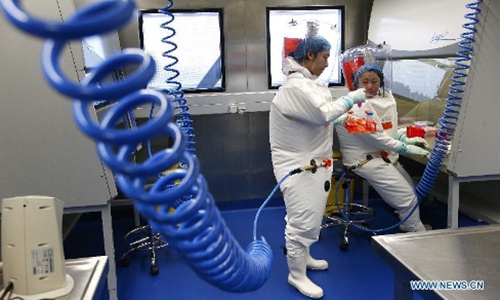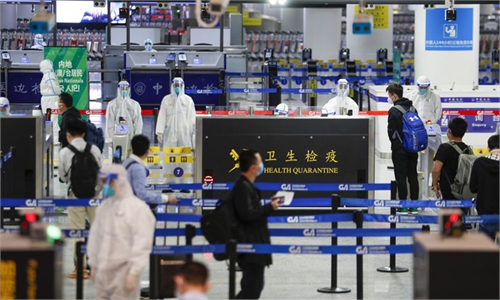New law fortifies China's legal shield on biosecurity labs against future infectious diseases

Researchers take part in a drill at P4 lab in Wuhan, capital of Central China's Hubei Province. Photo: Xinhua
China inaugurated the Biosecurity Law on Thursday, which is expected to further fortify the legal shield for the establishment and safe operation of more bio labs as China attaches greater importance to biosecurity as part of national security.The country's progress in establishing biosecurity could deal a firm blow to foreign attacks, like the conspiracy theory that "COVID-19's source came from a Wuhan lab," which the joint research by the WHO and China had concluded was "extremely unlikely."
Under the new Biosecurity Law, China will continue to build and approve more labs specializing in advanced pathogenic microbiology with a scrupulous and scientific manner, according to Deputy Minister of Science and Technology Xiang Libin.
China will carry out major scientific research to enhance its biosecurity science and technological capacity against future infectious diseases, Xiang said.
The ministry has examined and approved the construction of three biosafety level-4 labs, or P4 labs, and 88 biosafety level-3 labs, or P3 labs, in China, he said.
There is no official full list of those labs. Bai Chunli, president of the Chinese Academy of Sciences, said in April 2020 that China had two P4 labs in operation and 81 P3 labs in operation or approved for construction. In contrast, the US has 12 P4 and 1,500 P3 labs, according to media reports.
With the new law, China aims to enhance the country's bioscience research level and tackle the prevention and control of potential outbreaks of infectious diseases for animals and plants, Xiang said.
Biosafety is an integral part of national security and the new law has comprehensive regulations on biosafety-related activities, including rules on biosafety risk monitoring and early warning, risk assessment, and information sharing and release, the Xinhua News Agency reported.
Yang Zhanqiu, deputy director of the pathogen biology department at Wuhan University, told the Global Times on Thursday that the law on biosafety is a timely move for China to detail the construction and management of biosafety labs and provide a legal shield for scientific projects on biosafety, including infectious diseases, to be carried out in a scrupulous and professional manner.
During the fight against the COVID-19 epidemic, China swiftly built a number of P2 and P3 biosafety labs that provided strong technical support for the battle, experts noted. COVID-19 nucleic acid tests are conducted at P2 labs.
Enhancing construction of biosafety labs under the Biosafety Law is conducive for the country to launch quick responses, as well as efficient and safe research on major new infectious diseases in the future similar to the COVID-19, Yang said.
The P4 lab of the Wuhan Institute of Virology, which contributed a lot to China's early research into the coronavirus, has long been a target of US-led Western smears. A source close to the P4 lab spoke on condition of anonymity to the Global Times that those attacks are merely conspiracy theories backed by some US politicians.
Without authorization, no one can enter the laboratory, and no researcher can bring one piece of paper or one drop of water out of the laboratory, the source said.
The joint team of WHO and Chinese experts concluded that the theory that the novel coronavirus came from a lab leak was "extremely unlikely," after visiting the lab and seeing its strict inspection and operating standards.



